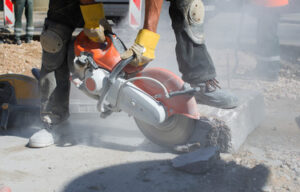Concrete contractors are vital to construction projects. They transform construction blueprints into a tangible reality. They are also responsible for adhering to building codes and ensuring structural integrity.

Whether they are a one-person operation or large construction company, today’s concrete contractor has access to business technology that can streamline many of their processes and operations. Contact Bakersfield Concrete Contractor Services for professional help.
A key part of concrete construction is the formwork. The term refers to the mold and framing used to contain and shape freshly poured concrete until it has reached its design size and strength. It also includes the joists, bearers, bracing, and foundations that support it.
A formwork designer must consider the construction method, erection sequence, and any additional loads such as external vibration on the completed structure when developing a formwork design. This ensures that the formwork is able to resist the pressure of the wet concrete and any additional loads.
There are several different types of formwork systems used in the construction industry. The most common are timber and steel. The former is made of lumber or plywood, while the latter is often fabricated offsite using a modular system that arrives at the jobsite pre-assembled. Steel formwork is usually more durable than timber and can withstand heavier loads.
One type of formwork that is particularly useful in high-rise construction is called slipforming. It consists of two-sided formwork that moves upward as each section is built, either through the use of a crane or by a rig that uses hydraulic rams to ascend. This makes it ideal for fast-track projects that must be completed within a tight timeframe.
Besides speeding up construction, formwork allows builders to construct custom slabs and columns on-site. This is important because it helps reduce the cost of the project. In addition, it ensures a better finish for the covered concrete surfaces.
Formwork erecting should be conducted in a safe manner to minimize risks and injuries. This involves ensuring that the formwork is stable and can withstand the required load, as well as maintaining housekeeping by controlling access to the work area, removing nails and rejected materials, stacking stripped forms, preventing tripping hazards, and more. The erection of permanent concrete elements requires additional safety considerations, such as establishing an escorted working zone and conducting inspections prior to concreting. In the event of an accident, the competent person should prepare a Safe Work Method Statement (SWMS). This will cover how the incident occurred, what remedial action is required, and who is responsible for implementing it.
Pouring
Concrete contractors work on both residential and commercial projects, preparing and pouring new concrete structures and repairing old ones. They typically handle every step of the process, including mixing ingredients and building formwork. They also supervise delivery and pouring to ensure that the concrete is mixed properly and poured quickly.
It takes special skill and artistry to produce a smooth finish that can withstand the demands of everyday use. Concrete contractors can also add decorative elements, such as colored or stamped overlays, to enhance the look of your concrete. They may also apply staining to the surface, adding a rich color that complements your landscaping or business aesthetics.
When choosing a concrete contractor, it is important to ask about their experience and reputation. Look for one with a proven track record of providing high-quality results and excellent customer service. They should be able to provide you with references from past customers as well as examples of previous work. You can also check with the local Better Business Bureau to see if any complaints have been filed against them.
In addition to ensuring the quality of their work, concrete contractors must be able to work closely with construction professionals to meet project deadlines and budget requirements. This requires attention to detail and an ability to follow instructions exactly. Any deviation from the specified materials or measurements can lead to costly mistakes and delay completion of the job.
A professional concrete contractor is fully licensed and insured, ensuring that they are capable of performing the job in compliance with local ordinances and regulations. They should also be able to obtain all necessary permits for the project before beginning work.
When hiring a concrete contractor, be sure to discuss any warranties or guarantees they offer. A good company will stand by their work and be willing to make things right if something goes wrong. They should be able to explain their warranty policy in full so that you are aware of what is covered and what is not.
While it is possible to do small jobs, such as pouring a patio or sidewalk on your own, it is not recommended for large projects. Concrete is heavy, and it can be dangerous to lift or move on your own. A professional concrete contractor will have the equipment and experience to get the job done safely and efficiently.
Customization
Concrete is one of the most common building materials and has many uses. This is why it’s important to work with a professional concrete contractor that understands the intricacies involved with this material. They can ensure the project is completed correctly and within budget. They also know the best way to handle any unforeseen challenges that may arise.
There are several different types of concrete, and each has its own set of advantages and disadvantages. A good concrete contractor can determine which type of concrete will work best for the specific needs of the job. This will ensure that the finished product is safe and durable. It will also be appropriate for the weather and environment where the project is taking place.
Some contractors specialize in a particular area of concrete construction, such as commercial projects or road construction. Others work on residential construction or home improvement jobs. A specialized concrete contractor can offer more competitive pricing for their services. They can also offer a variety of services that can save their clients money and time.
The popular phrase “walk a mile in someone else’s shoes” rings especially true for concrete contractors. They need to have a broad range of experience to be successful. This includes hands-on laboring on a crew, as well as the skills to manage a crew and schedule. They can also benefit from balancing their jobsite experience with office-based tasks, such as estimating and bidding.
A reputable concrete contractor can help with all aspects of commercial construction, from site prep and formwork to placing and finishing the concrete. They can also provide design and engineering services, including foundations, footings, and slabs. They can even install interior walls and partitions, steel reinforcement, and precast and poured in-place concrete structures.
In addition to providing general concrete construction services, a trusted local concrete contractor can also offer concrete staining and other masonry services. These can help property owners enhance the curb appeal of their homes and businesses. They can also improve the aesthetics of outdoor spaces by repairing existing concrete and installing new features. They can also add stamped patterns and stenciling to the concrete.
Free Estimates
Concrete contractors work with a variety of materials and construction processes. Their job is to turn a customer’s vision into a tangible reality with their expertise and craftsmanship. In order to do this, they must be able to accurately assess the project’s scope and requirements. They must also be able to stay on schedule and communicate effectively with other contractors.
Concrete is a very time-consuming material to work with. It requires a lot of planning and preparation to ensure that it is mixed correctly, poured on-time, and cured properly. If any one of these steps is done incorrectly, it could lead to costly delays and unforeseen issues down the line. For this reason, it is important that concrete contractors have excellent attention to detail and are able to follow instructions closely. This is especially true when working with structural elements such as foundations, walls, and slabs.
The best concrete contractors are able to complete their work quickly and efficiently. They have the expertise, equipment, and workforce to get the job done right the first time. This can save you both time and money in the long run, as it eliminates the need for costly repairs down the line. In addition, a professional concrete contractor will have the experience to troubleshoot any problems that may arise during the process.
A free estimate is an essential tool for any construction project. It can help you understand how much a project will cost and determine if it is within your budget. The estimate can also give you a better idea of the types of materials and services that will be needed to complete your project.
To create an accurate concrete estimate, you need to include the following information:
General Information This includes your company’s contact details and logo. It should also include the name and contact details of the person who will be handling the project.
Labor Costs
Include the number of hours and hourly rates for each type of labor needed to complete the project. You should also include any overtime costs that you might need to pay. Also, don’t forget to include the profit margin you need to earn in order to stay profitable and reinvest in your business.
